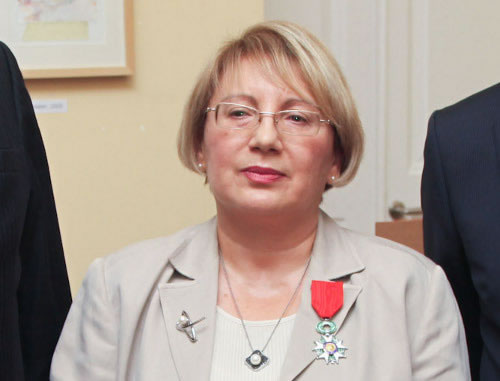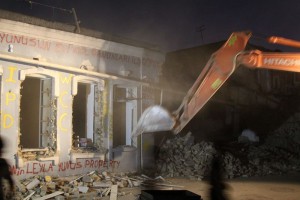
Leyla Yunus. Photo: Modern.az
23 April 2015
Leyla Yunus has been at the forefront of the struggle for human rights in Azerbaijan for many years. Leyla has worked on numerous projects relating to political persecution, corruption, human trafficking, gender rights, violations of property rights, monitoring of court proceedings, and peace initiatives. She has also worked for a number of years defending the rights of ethnic minorities in Azerbaijan, founded the country's first women's crisis center for victims of abuse, and is the author of a multitude of reports on political prisoners. Leyla's husband, Arif Yunus, is a historian and writer, and one of the most authoritative experts on the Karabakh conflict and Islam in Azerbaijan.
As the regime has tightened its grip on Azerbaijan's civil society, Leyla and her colleagues have for a long time stood up to repression and threats, fully aware of the risks.
On 30 July 2014, Leyla and her husband Arif were arrested and held at a Baku detention facility. Leyla was imprisoned the same day, and a three-month pre-trial detention was imposed. She remains there to this day. Arif Yunus' pre-trial detention was decided on 5 August 2014 and he is currently being held at Kurdakhani Prison in Baku. Leyla's arrest came only one day after she wrote an open letter[1] to President Ilham Aliyev, criticizing him for targeting human rights activists and bloggers, and "urging him not to go down in history as 'a tyrant and a dictator.'"[2]
As a co-founder of the Azerbaijan Popular Front (PFA) and Azerbaijan's Social Democrats Party, Leyla Yunus played an active role in fighting for Azerbaijan's independence from the Soviet Union and her country's transition to democracy. In 1989, Leyla was one of the founding leaders of PFA. She quit on 7 January 1990, amid escalating violence in Baku, to form the Social Democratic Party of Azerbaijan.[3] In the summer of 1992, Leyla became Deputy Defense Minister in the Popular Front government, responsible for dealing with the press. She resigned in February 1993.[4] Since 1995, Leyla has been the Director of the Institute of Peace and Democracy (IPD), which she co-founded with the goal of increasing public awareness about democratic processes and the challenges of establishing the rule of law. For her human rights-related work, Leyla received the 2013 Theodor Haecher Prize. In the same year, she was awarded France's most prestigious medal, the Legion of Honor.
She is an outspoken critic of Azerbaijan's political leadership, in both the national and foreign press. Since 2005, Leyla has been involved in track II public diplomacy efforts ("people-to-people diplomacy") and has launched a joint dialogue project with Armenia's Region Research Center, focusing on peace and reconciliation between the two countries.
Leyla's work has long been met with suspicion and pressure by the Azerbaijani government. Amnesty International released a statement on 23 April 2003:
"Eldar Zeynalov, Zemfira Yusif-Zade, E. Tarifova and Leyla Yunus have recently been subjected to a series of threats and attacks, which they fear may be state sponsored. Amnesty International is concerned for their safety and at continuing attempts to hinder the work of human rights defenders in Azerbaijan."[5]
By late 2011 the situation had worsened. With Baku hosting the 2012 Eurovision Song Contest, the government displaced hundreds of people as part of a beatification campaign to build new parks and other public amenities. Compensation for loss of property was never dispersed to some of those who lost their homes. This led Leyla to take on the cause of these people, organise protests, inform the press of this situation, and call on international policy-makers for help. In a New York Times interview she publicly denounced the forced evictions and violation of property rights.[6] Leyla told the paper that activists in Azerbaijan have received little support from the West because Azerbaijan is often viewed as too important for energy production and regional geopolitics. "We have an opportunity," she said, "to be a democratic country, a bridge between East and West, Christians and Muslims. If we lose this opportunity, we will [just] be [a] new Iran."[7]
In response, the government razed Leyla's home and the IPD's offices to the ground.


Photos: Turkan Kerimov (RFE/RFL)
Leyla Yunus, however, did not cease to criticize the human rights conditions in Azerbaijan. On 28 April 2014, Leyla and her husband, Arif Yunus, arrived at Baku Heydar Aliyev Airport accompanied by the French Ambassador and Deputy Chief of Mission of the U.S. Embassy. Leyla and Arif were detained and searched upon boarding an international flight to Doha, Qatar, where they would have continued on to Brussels for an international event. Their passports, computers, and other documents were confiscated. Leyla reported that she was subjected to inhumane treatment, threatened and, despite suffering from diabetes, forbidden from eating for an extended period of time.[8]
During the following days, the Yunus' apartment and the IPD offices were searched, and all computers and electronic media were seized.
Today, still in detention, both Leyla and Arif are in fragile health and have been denied adequate treatment.[9] From prison Leyla continues to call out on Azerbaijan's leaders and ruling families about their human rights violations. In a letter written from her jail cell, she stated:
"You can throw lavish dinners and raise toasts to our physical sufferings, you – the Lemberanskis, Pashayevs, Ahmadovs, Usubovs, Gasimovs, Garalovs. You are worthy of your commander-in-chief. You could not withstand our words. You responded with violence. But that is a Pyrrhic victory."[10]
The list of political prisoners was recently made public. It now includes Leyla and her husband Arif's names.
[1] Leyla Yunus, "What are you afraid of Mr. President?" Medyan TV, 30 July 2014.
[2] Robert Coalson and Ilkin Mammadov, "Azerbaijan Gets Tough In Bid To Silence Its Loudest Critic," Radio Free Europe/Radio Liberty, 31 July 2014.
[3] Thomas de Waal, Black Garden: Armenia and Azerbaijan Through Peace and War, New York University Press: 2013.
[4] Thomas de Waal, Black Garden: Armenia and Azerbaijan Through Peace and War, New York University Press: 2013.
[5] "Fear for Safety," Amnesty International, 28 April 2003.
[6] Ellen Barry, "Offices of Activist Bulldozed in Azerbaijan," New York Times, 12 August 2011.
[7] David Herszenhorn, "Welcoming Eurovision, but Not the Scrutiny," New York Times, 23 May 2012.
[8] "Azerbaijan's Leyla Yunus, human rights defender, held" BBC, 29 April 2014.
[9] "Azerbaijan: Ongoing arbitrary detention and deterioration of the health condition of Ms. Leyla Yunus." FIDH, 16 August 2014.
[10] "'Pyrrhic Victory': Leyla Yunus Writes a Letter from Jail," Azeri Report, 12 August 2014.
